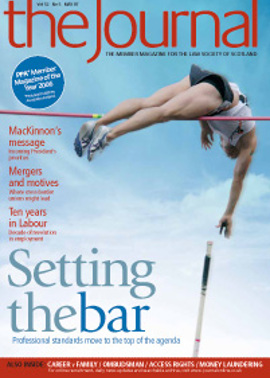Court plans with little appeal

Following last year’s consultation document, mistitled “Strengthening Judicial Independence in a Modern Scotland” (Journal, June 2006, 16), in February the Scottish Executive issued a document entitled “Proposals for a Judiciary (Scotland) Bill”. Again only 90 days were allowed for responses.
The document is in two parts. Part 1 sets out the Executive’s plans in relation to, amongst other matters, judicial independence, the role of the Lord President, a statutory Judicial Appointments Board, judicial conduct, and removal from office. Part 2 is a draft bill dealing with the bulk of the plans, apart from (pending further discussion) judicial involvement in running the Scottish Court Service.
Some of the Part 1 narrative has, disappointingly, a dismissive air when referring to objections and concerns over the consultation paper. In relation to a call by the Faculty of Advocates and the Law Society of Scotland for a more thorough assessment by an independent inquiry, the document, commenting that this would take time, states: “this view was not, however universally held and, on balance, we have decided that an independent inquiry is not necessary”.
Regarding the proposal to introduce a statutory guarantee of judicial independence, despite this having been a constitutional convention for some 400 years, the paper states: “The balance of view overall favoured some provision being made.” This balance is difficult to find in the responses to the consultation, unless there is a plethora of confidential responses. Meekly, it is suggested that “it would not be right” if Scotland were the only part of the UK where the Executive was not fully bound by such a statutory guarantee.
The role of the Lord President is not yet part of the bill, but the intention is to make him or her “Head of the Judiciary in Scotland”, with a range of statutory responsibilities. While some of these are admirable, particularly in relation to arrangements for general deployment of the judiciary, disciplinary powers, and arrangements for welfare and training, the Lord President (worryingly described as “head of the courts”) is to become responsible for securing the efficient disposal of business in Scottish courts. (On a detailed note, a proposed power to deploy a sheriff on a compulsory basis ignores the principle that every judge and sheriff enjoys judicial independence, which is not some corporate asset.)
The document indicates it is likely that the Court Service should be overseen by a non-executive board chaired by the Lord President and including other judicial members. A chief executive, reporting to the board, would be accountable to ministers in the Scottish Parliament. This is something of a fiction when it is the Lord President and the board who would be responsible for performance, delegating authority to the chief executive. The judiciary should be completely divorced from the Scottish Court Service. Running the Service is an Executive function. In short the general proposal on the Lord President flies full in the face of the constitutional convention of judicial independence.
Turning to the provisions for the Judicial Appointments Board, those concerned should take on board Sheriff D J Cusine’s observations, 2007 SLT (News) 9. Amongst other things he highlights what other countries have done in relation to legal representation on judicial selection boards. If the position elsewhere is of concern to the Executive in relation to a statutory guarantee of judicial independence, perhaps the same should apply in relation to selection boards.
The proposals for removal from office give particular cause for concern. The Sheriffs Association, we are told, was “strongly opposed” to altering the arrangements in s 12 of the Sheriff Courts (Scotland) Act 1971, since any change to a tribunal system would undermine security of tenure and consequently independence of the office of sheriff. With further dismissiveness, the document concludes: “this concern was not shared by all respondents”, so change there will be. One does not need to be a lateral thinker to deduce that if any judge or sheriff appears before such a tribunal, his or her career is effectively over, regardless of the conclusion reached. Astonishingly, the draft bill does not provide any form of appeal – a right available to every accused person who appears before a judge. The whole elaborate procedure is proposed despite the fact that since 1689 no Court of Session judge has been removed from office. It will undermine the relationship between bar and bench, and illustrates a lack of understanding of the concept of judicial independence.
In conclusion, the proposals document largely ignores major criticisms made in response to the consultation document, particularly in relation to the draft provisions for removal from office of judges and sheriffs, and the role of the Lord President as “head of the courts”. It is an invasion on the doctrine of judicial independence. The Scottish Executive and those advising it would do well to reconsider their position on the need for an independent inquiry.
In this issue
- Block fees: the story behind the changes
- Strategic advance
- Court plans with little appeal
- Under commission
- Two into one can go
- Ten years of labour
- Career v Family
- Monitor - at your own risk
- Raising the standard
- Society shapes the changes
- Society shapes the changes (1)
- Money laundering to change again
- Border and Immigration Agency launches
- Dealing positively with client concerns
- From the Brussels office
- Winning ways
- Toothless against spam?
- Risk reinvented
- Technical but essential
- Pension sharing tips on divorce
- In pursuit of simplicity
- In pursuit of simplicity (1)
- First in the class
- Scottish Solicitors' Discipline Tribunal
- Website reviews
- Book reviews
- On the road
- Access or excess?
- Alterations are no 2 problem
- ARTL: upgrade now for security






